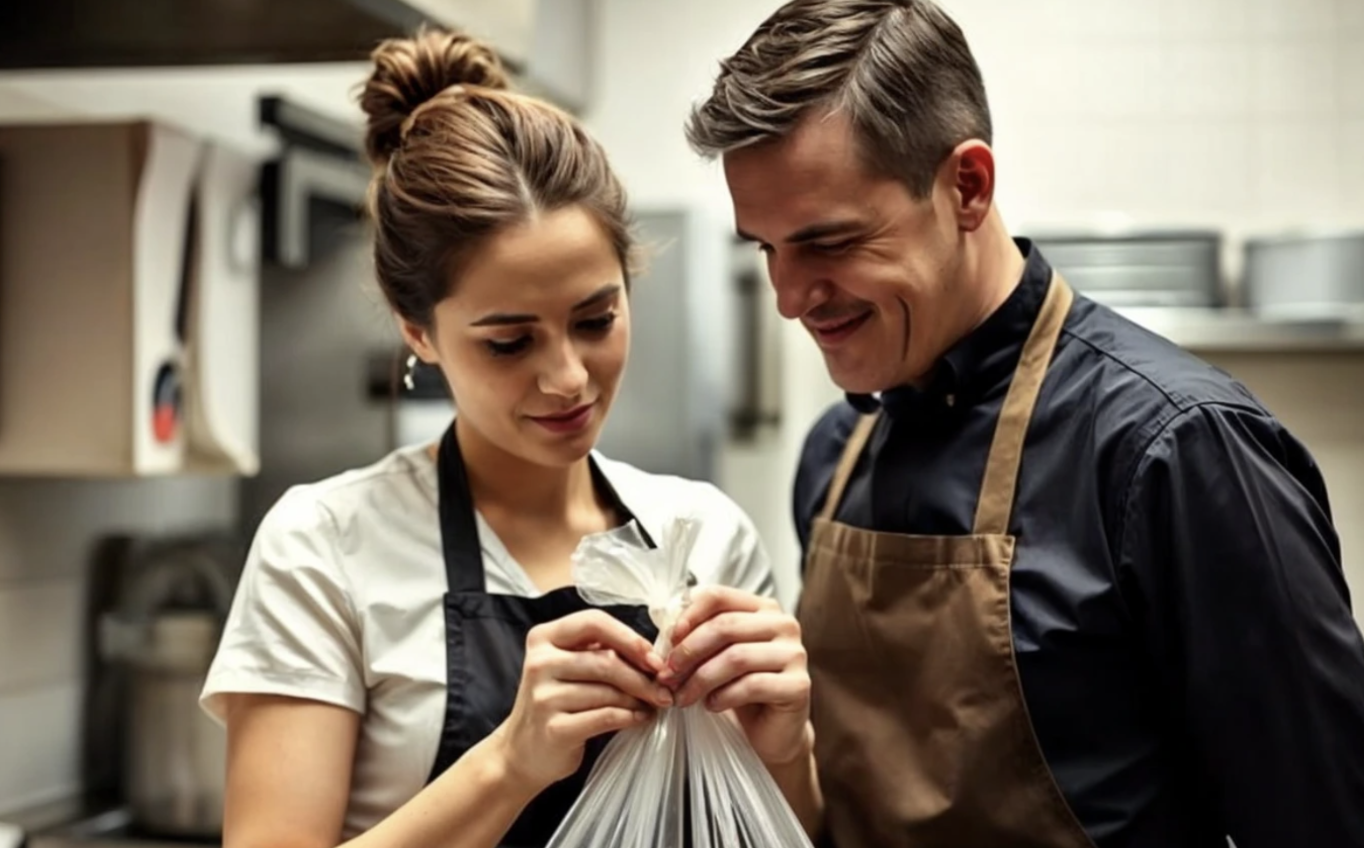The evening light softly streamed through the large windows of a cozy little restaurant named ‘Old Town.’ Pavel, wiping down tables after the last guests had left, automatically arranged the salt shakers and straightened the tablecloths. The day was coming to an end, but fatigue weighed on his shoulders like a heavy burden. He rubbed his eyes and glanced at the clock—only half an hour to go before he could finally head home.
From the kitchen came the clink of dishes and the muted conversations of the cooks finishing their shift. The owner, Anna Sergeyevna, had already left, entrusting Pavel to close up the hall. He cherished these quiet minutes after work the most—a time to relax a bit from the day’s hustle.
Pavel paused by the window, watching the falling snowflakes. This year’s winter was especially harsh, and the few passersby, wrapped in their clothes, hurried to shelter from the cold. The waiter shuddered, remembering he had forgotten his mittens at home. ‘It’s fine, I’ll manage the short walk,’ he thought.
Suddenly, his attention was drawn to movement at the entrance. In the dim light of a street lamp, Pavel noticed a female figure. The woman stood, hesitantly shifting from foot to foot, clearly reluctant to enter. Her silhouette seemed fragile in a worn gray coat, and her dark hair was tousled by the wind.
‘Sorry, we are closing,’ Pavel said routinely, moving towards the door.
The girl flinched and stepped back into the shadow, but he managed to catch a glimpse of her tired face and dim eyes. Something in her eyes made him pause. Pavel realized—she wasn’t planning to come in. She just stood there, looking at the leftovers still not cleared from the tables.
Pavel’s heart clenched. He remembered how he once found himself in a tough situation, counting pennies until payday. But at least he had a home back then. This girl… Who knows what brought her here so late?
Pretending to be busy cleaning, he surreptitiously watched the stranger. She finally decided to enter, quietly slipping into the hall. Her movements were cautious, almost inaudible. The girl approached one of the tables with leftover food and quickly began packing the food into a worn bag.
Pavel knew he should stop her—it was the rule. But something inside held him back. Perhaps it was memories of his own difficult days or simply genuine sympathy.
‘Wait,’ he said softly, trying to speak as gently as possible. ‘I can pack this in containers. It’ll be more convenient.’
The girl froze like a frightened animal. Fear flickered in her eyes, and a blush of shame appeared on her cheeks. She clearly expected to be scolded or chased away.
‘Don’t be afraid,’ Pavel added, pulling out clean containers. ‘This food would otherwise go to waste. Better that it helps someone.’
The girl nodded uncertainly, not looking up. Pavel quickly and neatly transferred the leftovers into containers, adding a couple of fresh buns he had set aside earlier. The containers also got leftovers from the kitchen.
‘Here you go,’ Pavel handed her the bag. ‘There’s both hot dishes and salads. All fresh.’
‘Thank you,’ she whispered barely audibly and hurried to the exit.
That night, Pavel tossed and turned in bed. The stranger’s weary face, her trembling hands hurriedly gathering food haunted him. What brought her here? Where does she live? Does she have a family, children?
Pavel kept glancing at the front door, hoping the girl would return. And she did—closer to closing, she appeared at the threshold again. This time Pavel was prepared. He had specifically saved some untouched servings from the visitors.
‘Come in,’ he invited her. ‘I was just about to clear the tables.’
The girl cautiously approached. In the dim light of the lamps, Pavel could see her face better. She was young, perhaps a bit younger than him, but fatigue and anxiety aged her.
‘What’s your name?’ Pavel asked as he arranged the food into containers.
‘Lena,’ she answered quietly, fiddling with her scarf.
‘I’m Pavel,’ the waiter smiled. ‘Don’t worry, I understand. Times are tough for many.’
Lena remained silent, but her shoulders relaxed slightly. Pavel noticed how carefully she packed the containers into the bag, as if dividing them into portions. Her movements had some system.
‘You’re not only taking for yourself, are you?’ he asked cautiously.
Lena flinched and looked away. Her hands paused over the bag for a moment, but she didn’t answer. Hastily thanking him, she rushed to the exit.
The following days turned into a strange ritual for Pavel. He began to pay closer attention to what visitors left behind, devising ways to keep the food warm until Lena’s arrival. Sometimes he even asked the chef, Mikhail Petrovich, to set aside a portion or two, explaining that he wanted to take it home.
Every evening, as the clock hands moved closer to closing, Pavel’s heart beat faster. He found himself eagerly awaiting the appearance of the fragile figure in the worn gray coat. Lena became an integral part of his evenings, although their interaction was limited to brief phrases.
That day, the restaurant was almost empty—the frost drove people indoors. Pavel was wiping tables when Lena appeared in the doorway. Her cheeks were red from the cold, and snowflakes melted on her eyelashes.
‘Come in, it’s very quiet today,’ Pavel smiled. ‘Maybe have some tea? It’ll warm you up a bit.’
Lena paused, clearly hesitating. Doubt flickered in her eyes, but the cold, apparently, overcame her caution.
‘If it’s not too much trouble,’ she said quietly.
Pavel waved towards the far table.
‘Sit down, I’ll bring it right now.’
Soon, a cup of hot tea and a plate of pies were in front of Lena. She wrapped her frozen fingers around the cup. Pavel noticed a shadow of pleasure from the warm touch cross her face.
Lena took a small sip. Then she whispered:
‘Thank you. I haven’t had such tasty tea in a long time.’
Pavel sat opposite, warmly smiling:
‘That’s a special recipe from Mikhail Petrovich. He adds some herbs.’
Silence hung in the air, not the tense kind as before, but somehow cozy. Lena slowly drank her tea, and Pavel stealthily watched her. In the warm light of the lamps, her face seemed younger, her features softened.
‘Why do you do this?’ Lena suddenly asked, raising her eyes to Pavel.
‘What exactly?’
‘Help me. Don’t drive me away,’ Lena looked away. ‘Most people prefer to ignore someone like me.’
Pavel thought for a moment.
‘You know, I once found myself in a tough situation. Lost my job, didn’t even have money for food. If not for the help of others…’ the waiter shook his head. ‘Sometimes all it takes is just reaching out a hand.’
Lena looked at him intently, as if assessing the sincerity of his words.
‘They talk about help in shelters, too,’ she smiled sardonically. ‘Only sometimes they’re not what they seem.’
Bitterness sounded in her voice, and Pavel understood—behind those words lay something personal, possibly painful. But he didn’t inquire further. Instead, he poured more tea and pushed the pies closer to Lena.
They talked for almost an hour. Lena didn’t share much about herself but listened attentively to Pavel’s stories about funny incidents in the restaurant, sometimes even chuckling quietly. When it was time to leave, the girl smiled—for the first time genuinely warmly.
The next few days passed as usual. Lena came closer to closing, Pavel gathered food for her, and they exchanged a few words. But then something unexpected happened—the girl didn’t show up. Pavel kept the lights on in the hall until the last moment, glancing at the door, but Lena didn’t appear.
She didn’t come the next day either. Anxiety grew inside Pavel. What could have happened? Maybe she was sick? Or worse, got into trouble? The waiter found himself constantly looking at the clock and the door, hoping to see the familiar silhouette.
‘You seem off,’ Mikhail Petrovich noticed, watching as Pavel once again peered out the window.
‘Just thinking,’ the waiter dismissed, unwilling to explain.
At the end of the shift, Pavel accidentally overheard a conversation between visitors.
‘Are you going to the charity event downtown tomorrow? They say it’ll be an interesting performance. Some new homeless assistance fund is being presented.’
Pavel froze. Something told him—he needed to go there. Perhaps it had nothing to do with Lena. But his intuition insistently suggested otherwise.
Pavel dressed in his best suit and headed downtown. The event was held in a large conference hall of a hotel. People in expensive outfits, journalists with cameras, buffet tables. Everything looked solid and official.
The next speaker took the stage. And Pavel couldn’t believe his eyes. In an elegant business suit, with neat hair and light makeup, stood Lena. But this was a different Lena. Confident, calm, radiating inner strength.
‘Good evening,’ she began, and her voice, so familiar yet now clear and resonant, filled the hall. ‘I want to tell you about our new project.’
Pavel stood, unable to move. Hundreds of questions swirled in his mind, but gradually the picture began to come together. All those evenings, conversations, cautious glances from Lena—now took on a new meaning. The girl wasn’t just taking food—Lena was testing, observing, studying people’s reactions.
Lena continued:
‘In our city, hundreds of people are left without help every day. But those who can help, pass by. We are looking for people with open hearts. Those ready to lend a hand without asking too many questions.’
Pavel listened. Lena’s words resonated in his soul. The waiter recalled the first time he saw Lena at the restaurant door, how he offered to pack the food in containers, how he brewed tea for her on cold evenings. All this time, the girl was looking for real, sincere people.
After the presentation, a buffet began in the hall. Pavel stood aside, lost, unsure whether to approach Lena. But the girl noticed him and, excusing herself from her conversation partners, headed towards the waiter.
‘Didn’t expect to see me here?’ a slight smile played on Lena’s lips.
‘To be honest, no,’ Pavel admitted. ‘So all this time…’
‘Sorry I didn’t tell you earlier,’ Lena said softly. ‘I needed to understand how sincerely you care about helping others. You know, many people are willing to help when it benefits them or when they are being watched. But true kindness shows in the little things, when no one sees.’
Pavel was silent, pondering the words he heard. A strange feeling overwhelmed him—not resentment, no. More like surprise and a kind of warmth. Because he really helped not for praise or gain.
‘I never thought of it that way,’ Pavel finally said. ‘Just… couldn’t do otherwise. When you see someone in trouble, how can you just walk by?’
‘That’s why you passed the test,’ Lena pulled a business card from her purse. ‘We are looking for people like you, Pavel. Those who see others primarily as people, not their social status or appearance.’
‘You can always come to the restaurant,’ Pavel smiled, taking the business card. ‘Though now, probably not for food.’
Lena laughed—easily and openly, not at all like before.
‘And you can come to our foundation. We need people who truly care about others. Think about it.’
Pavel couldn’t sleep all night after the event. He kept rereading the business card, remembering Lena’s speech, her words about help and kindness. Something changed in his perception of the world, as if a new door had opened.
A week later, the waiter went to the address on the business card. The small office of the foundation was located in an old building downtown. Lena greeted him at the entrance, as if she knew he would come.
A month passed. Pavel continued working at the restaurant. But now, every weekend, he spent at the foundation. Together with other volunteers, he distributed food to those in need. Helped organize charity lunches. Taught chefs to cook large portions from simple ingredients.”


